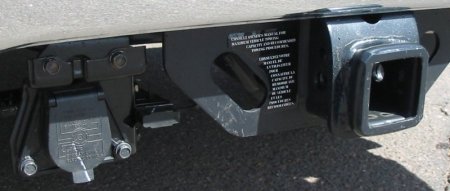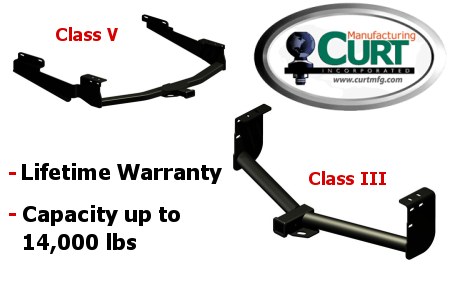Curt After-market Trailer Hitches
Jason Lancaster | Oct 07, 2009 | Comments 8
Considering that towing a trailer is one of the main reasons people buy pickup trucks, it’s no surprise that most trucks come with trailer hitches. However, not all trucks come with the right trailer hitch. Some auto manufacturers try and save money by installing a light-duty hitch on a heavy-duty truck. In fact, it’s not uncommon to find a new or used half-ton pickup without a hitch at all.
Fortunately, there’s an easy fix.
Curt Manufacturing Inc, better known as Curt, is a precision builder of after-market trailer hitches. Curt uses an army of precision welders, electricians, and finishers to produce some of the highest quality tow components in the industry.
First, here’s a quick review of trailer hitch classes and weight ratings:
| Class I | 2,000 lbs |
| Class II | 3,500 lbs |
| Class III | 5,000 lbs |
| Class IV | 10,000 lbs |
| Class V | 10,000+ lbs |
As you can see, the vast majority of half-ton pickup trucks need a Class IV or Class V hitch (FYI – check out “What To Know Before You Tow” for some trailer towing and trailer hitch basics). Curt manufactures both a Class III and Class V hitch for the Toyota Tundra (along with most brands of pickups), with the Class V hitch capable of pulling more than the Tundra is rated for (14k lbs with a weight distributing setup). Each hitch also features the ability to add a Curt T-Connector to facilitate trailer brake light wiring, and don’t forget that most trucks without a trailer hitch still include a basic 5 pin trailer connection at the back bumper.

The stock class IV receiver hitch on a 2007 Toyota Tundra.
Curt protects their steel hitches with a layer of with black powder-coating, and if you’re looking to dress-up your truck you can order a more arresting color (such as bright red or silver) in order to match the finish on your pickup. Each hitch has been custom-built to specifically conform to the underside of your truck so as to ensure that there will be no need to drill any holes in your truck’s frame during installation. Drilling holes can weaken a frame, and drilling also makes installation more difficult. Because Curt custom-designs their hitches to each application, they can be bolted on with only a few basic tools.
When you’re selecting an aftermarket hitch for your truck, a do-it-yourself installation process is pretty important. Some hitch brands require professional installation, which can seriously add to the total price of the item. Professional install can be nice (especially if your truck’s frame is a little old), but a do-it-yourself kit from Curt isn’t so bad. For example, there are typically only six steps to putting a Class-III Curt hitch on your truck. The only tools required are 3 different sockets, a torque wrench, and a single standard wrench.
As always, corrosion is a concern when installing anything on the underside of a pickup truck. The “dirty side” is one area where dirt, grime, and road salt tend to accumulate over time. Because Curt uses robotic welds and a sealing process that helps to prevent the intrusion of water, all Curt hitches come with a lifetime warranty.
Depending on the hitch rating and vehicle application, Curt hitches are usually priced between $150.00 (class 3) and $350.00 (class 5). Considering the fact that Curt hitches are designed to be self-installed, they provide a significant value in a segment that offers a very wide range of quality when it comes to available hitch designs. In fact, this is one of the rare instances in the automotive world where going with a trusted and reliable brand name doesn’t entail having to shell out a premium price.
Bottom Line: If you need to upgrade an existing hitch OR add a hitch to a truck that doesn’t have one, check out a receiver hitch from Curt.
Do you have any experience with a Curt receiver hitch? Leave a product review and comment below.
Filed Under: Toyota Tundra Accessories



Maybe that is why all the farm and fleet stores in WI and other states switched from Valley Industries to Curt? I never had a problem with Valley receiver hitches and ball mounts, etc., but there must have been a reason for the switch to Curt from Valley. Not to be picky, but the picture of the receiver hitch is not a 2010 current Tundra but a 2007-2009 Tundra. The reason I can tell is the wiring harness is the old design that hangs down more and not more side to side like on my 2010 tundra. I wonder has anyone ever towed close to 10,000 lbs. with the stock Class IV receiver hitch on their tundras and what it did to the suspension without added lift and support? I bet towing anything over 7,000 lbs. would surely sag the back end a lot and raise the front end up way too much to be safe to drive without doing some modifications to the stock suspension or am I wrong?
mk- Good eye! That IS an old photo. I’ve added a note. Also, the truck is rated to pull 10,000 lbs safely but you’ve read here that 80% of max seems like a prudent load. I’ve pulled a 10k lbs racecar trailer off the hitch in the past with a diesel F250 and it did just fine…but the back end was definitely loaded up and the front-end didn’t feel all that tied down. Can’t imagine it would be much different in a half ton.
I only tow a boat about 3,000lbs max. So I would never know what my truck can do. It’s okay by me. I use it for what I got it for.
Must be a very nice boat/motor weighing 3,000lbs? My 17′ foot aluminum fishing boat, trailer, and 40hp Mercury outboard probably only weigh 1500lbs. maximum and about 2,000lbs. maximum pulling 3 ATV’s with trailer. Tundra does not even break a sweat, but I do use tow/haul mode to keep the tranny from kicking in and out of 6th gear and keep it in 5th gear longer. Tow/haul mode seems to work great and actually works even towing 2,000lbs. I agree with Jason, would not want to push over 8,000lbs. towing a large camper, etc., safely.
mk – You know an old sailor like Mickey probably has the coolest damn boat in the world! 🙂
I’ve never towed with the truck yet but at least the hitch is there. I can’t wait to put a U-haul behind it and do a one-way trip back home….
I was checking out their website. They look pretty nice. I want to put a hitch on my Sienna (which has predrilled holes) and the do-it-yourself idea really resonates with me. Has anyone ever heard of any problems with Curt hitches? Thanks for this article, Jason. Before this I had never even heard of Curt before.
Brian – You bet. A trailer hitch company I used to work with all the time back in my dealer days sold Curt hitches almost exclusively. They’re a good yet inexpensive hitch manufacturer.